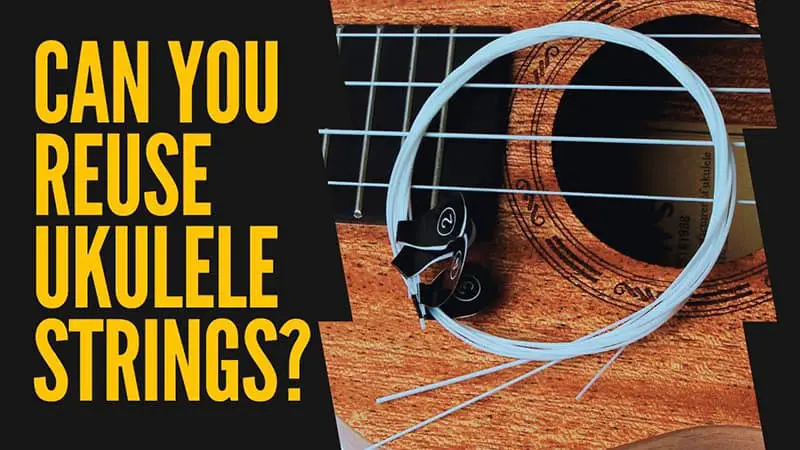It’s often pretty saddening that you find your favorite uke not just sounding the same. At the same time, ukuleles age with time and can indeed end up sounding a bit out of tune after a while. But the main culprits here are the ukulele strings.
While many players prefer changing their string setup from time to time, it doesn’t mean that you have to throw them out right away. On the contrary, all ukulele strings have a certain lifespan, and you need to know when it’s over. So, that brings us to the question – can you reuse ukulele strings?
You can reuse ukulele strings. But some conditions apply if you want to get proper performance out of them. So if you’re going to recycle any ukulele strings even when they don’t fulfill the necessary conditions, it’s best to use them somewhere other than your uke.
With that said, let’s dive deeper into how you can reuse your uke strings and what to expect.
The Checklist
As we mentioned earlier, you can reuse ukulele strings and put them on another uke. But there are some conditions that those strings need to fulfill. Otherwise, you won’t get the best musical experience out of your stringed instrument.
String Condition
It’s exactly as it implies. First, you need to take a good look at the physical condition of your strings. Do they look like they’re going to fall apart any second? Or do they look like they still have a few strums in them?
If they don’t look too good, chances are, they aren’t in usable condition either. So, while they may be used for an emergency situation, you shouldn’t play these strings in the long run.
Try to judge the strings by their present condition, as in when you’re trying to restring them. Don’t judge their condition by how they looked when you took them off previously. While they may have been in good condition when you took them off, they may have suffered some damages in the meanwhile.
Length
A lot of musicians tend to cut their strings to match the exact length of the instrument during the initial installation. While that may work for the first run, it leaves you with very little error space to work with.
So, if you don’t have much give in your string length, you’ll have a hard time holding the string in their keyhole as you keep tightening the keys over time.
Tune
One sign of uke strings’ health is their tune. Granted, ukulele strings don’t tend to stay in tune for long. But as their health deteriorates, they begin to go out of tune sooner rather than later.
Once you sense that the intervals between each tuning session are getting smaller, that is a warning sign, and you shouldn’t consider reusing those strings.
You’ll also notice that the strings have lost their brightness and overall shine. They’ll also feel a bit dull and unresponsive at times. These are all signs that their times are up, and it’s about time you let the strings rest for good.
How to Preserve Ukulele Strings?
If you’re dead set on reusing your ukulele strings later, there are a few things you can do to make sure they last the second time. If you follow these steps, you’ll find that the strings are in a sufficiently good state for you to use them.
Store the Strings Properly
Storing your uke strings in a closed, dry environment is a great way to preserve their condition. That way, it won’t suffer from any moisture damage during this time, and you’ll be easily able to use them again.
Clean Them After Each Use
Make sure to clean your ukulele after each practice session. Our fingers have moisture. And over time, as you use your ukulele, that moisture can harm both the body and strings of your ukulele.
If you use a soft piece of 100% cotton clothing to wipe the strings and, at the same time, the fret, it’ll keep both in their best condition.
How Long Can Ukulele Strings Last?
There’s no one definite answer to this question as the strings’ lifespan depends on their usage. However, ukulele strings generally last from eight months to a whole year if you want a rough estimate. So, you need to consider the time you used them before and their condition before you start using them again.
With that being said, your playing style is going to determine how long your uke string lasts, as in, how long it remains harmonically and tonally stable.
Strum Gently
You’ll also need to take into account what you strum with and how you strum with it. As a general rule, the harder you play, the shorter the lifespan of your strings is.
So if you’re a heavy strummer and like to play loudly, chances are you’re going to run out of strings quickly. And on top of that, if you’re a fan of the plectrum or the pick, that’s going to hurt your strings.
Use A Pick Carefully
While it may raise some eyebrows in the “loftier” circles, that’s not the main issue with picks. Using picks on ukes is one of the most destructive ways to shorten the life of your strings.
So, if you relish in playing thrash metal on your uke and use a pick while you’re at it, it’s better that you invest in a new set of strings rather than reusing an older set.
But if you prefer using your fingertips and thumb to play some of the mellower tunes, reusing some of the older strings shouldn’t be a problem for you.
Final Words
Ukuleles use nylon strings which have a longer lifespan than the metals strings of the acoustic guitar. That’s what gives you the possibility of reusing them later or on another uke.
However, you need to consider their condition before you start using them. After all, you don’t want them to break during a concert, right? We hope that gives you a clear answer to the question: can you reuse ukulele strings? Happy strumming!



